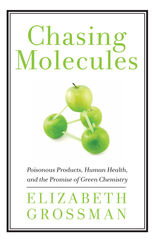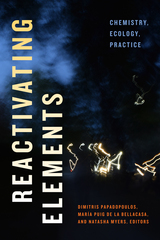2 books about Environmental chemistry

Chasing Molecules
Poisonous Products, Human Health, and the Promise of Green Chemistry
Elizabeth Grossman
Island Press, 2011
Each day, headlines warn that baby bottles are leaching dangerous chemicals, nonstick pans are causing infertility, and plastic containers are making us fat. What if green chemistry could change all that? What if rather than toxics, our economy ran on harmless, environmentally-friendly materials?
Elizabeth Grossman, an acclaimed journalist who brought national attention to the contaminants hidden in computers and other high tech electronics, now tackles the hazards of ordinary consumer products. She shows that for the sake of convenience, efficiency, and short-term safety, we have created synthetic chemicals that fundamentally change, at a molecular level, the way our bodies work. The consequences range from diabetes to cancer, reproductive and neurological disorders.
Yet it’s hard to imagine life without the creature comforts current materials provide—and Grossman argues we do not have to. A scientific revolution is introducing products that are “benign by design,” developing manufacturing processes that consider health impacts at every stage, and is creating new compounds that mimic rather than disrupt natural systems. Through interviews with leading researchers, Grossman gives us a first look at this radical transformation.
Green chemistry is just getting underway, but it offers hope that we can indeed create products that benefit health, the environment, and industry.
Elizabeth Grossman, an acclaimed journalist who brought national attention to the contaminants hidden in computers and other high tech electronics, now tackles the hazards of ordinary consumer products. She shows that for the sake of convenience, efficiency, and short-term safety, we have created synthetic chemicals that fundamentally change, at a molecular level, the way our bodies work. The consequences range from diabetes to cancer, reproductive and neurological disorders.
Yet it’s hard to imagine life without the creature comforts current materials provide—and Grossman argues we do not have to. A scientific revolution is introducing products that are “benign by design,” developing manufacturing processes that consider health impacts at every stage, and is creating new compounds that mimic rather than disrupt natural systems. Through interviews with leading researchers, Grossman gives us a first look at this radical transformation.
Green chemistry is just getting underway, but it offers hope that we can indeed create products that benefit health, the environment, and industry.
[more]

Reactivating Elements
Chemistry, Ecology, Practice
Dimitris Papadopoulos, María Puig del la Bellacasa, and Natasha Myers, editors
Duke University Press, 2021
The contributors to Reactivating Elements examine chemicals as they mix with soil, air, water, and fire to shape Earth's troubled ecologies today. They invoke the elements with all their ambivalences as chemical categories, material substances, social forms, forces and energies, cosmological entities, and epistemic objects. Engaging with the nonlinear historical significance of elemental thought across fields—chemistry, the biosciences, engineering, physics, science and technology studies, the environmental humanities, ecocriticism, and cultural studies—the contributors examine the relationship between chemistry and ecology, probe the logics that render wind as energy, excavate affective histories of ubiquitous substances such as plastics and radioactive elements, and chart the damage wrought by petrochemical industrialization. Throughout, the volume illuminates how elements become entangled with power and control, coloniality, racism, and extractive productivism while exploring alternative paths to environmental destruction. In so doing, it rethinks the relationship between the elements and the elemental, human and more-than-human worlds, today’s damaged ecosystems and other ecologies to come.
Contributors. Patrick Bresnihan, Tim Choy, Joseph Dumit, Cori Hayden, Stefan Helmreich, Joseph Masco, Michelle Murphy, Natasha Myers, Dimitris Papadopoulos, María Puig de la Bellacasa, Astrid Schrader, Isabelle Stengers
Contributors. Patrick Bresnihan, Tim Choy, Joseph Dumit, Cori Hayden, Stefan Helmreich, Joseph Masco, Michelle Murphy, Natasha Myers, Dimitris Papadopoulos, María Puig de la Bellacasa, Astrid Schrader, Isabelle Stengers
[more]
READERS
Browse our collection.
PUBLISHERS
See BiblioVault's publisher services.
STUDENT SERVICES
Files for college accessibility offices.
UChicago Accessibility Resources
home | accessibility | search | about | contact us
BiblioVault ® 2001 - 2024
The University of Chicago Press









